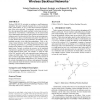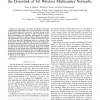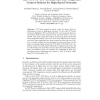1212 search results - page 33 / 243 » Fairness in Peer-to-Peer Networks |
MOBICOM
2004
ACM
14 years 3 months ago
2004
ACM
Wireless IEEE 802.11 networks in residences, small businesses, and public “hot spots” typically encounter the wireline access link (DSL, cable modem, T1, etc.) as the slowest ...
MONET
2011
2011
Achieving End-to-end Fairness in 802.11e Based Wireless Multi-Hop Mesh Networks Without Coordination
13 years 5 months ago
Abstract To mitigate the damaging impacts caused by interference and hidden terminals, it has been proposed to use orthogonal channels in wireless multi-hop mesh networks. We demon...
VTC
2008
IEEE
14 years 4 months ago
2008
IEEE
—In this paper we present an efficient cross-layer scheduling algorithm designed for resource allocation in downlink of 4G wireless multicarrier networks. This study focuses on ...
OPODIS
2004
13 years 11 months ago
2004
TCP Reno congestion control carries two issues. First, its performance is poor in high-speed networks. To solve this TCP Reno drawback, HighSpeed TCP and Scalable TCP were proposed...
INFOCOM
2005
IEEE
14 years 3 months ago
2005
IEEE
— We consider the problem of allocating resources (time slots, frequency, power, etc.) at a base station to many competing flows, where each flow is intended for a different re...



